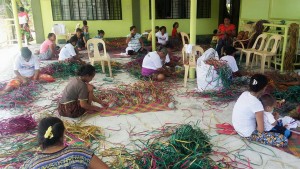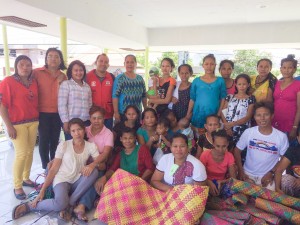

Iligan City — The Department of Social Welfare and Development in collaboration with the local government of Iligan City provided a 3-day skills training on weaving to the Bajau community last February 17 to 19, 2016 to contribute to the improvement of their socio-economic status through capacity building that will prepare them in their micro-enterprise ventures and other livelihood opportunities.
The Bajau in the Philippines are often referred to as the ‘sea gypsies‘, people that live not only by the sea, but often on the sea. Officially known as the Sama or Samal, these groups are an indigenous fishing icon and their lifestyles are unique in many ways. The Bajau are traditionally from the numerous islands in and around the Sulu Archipelago. They are heavily drowned around the coastal regions of Mindanao and the northern regions of Borneo. The distraction and conflict in their places of origin caused them to elope and seek refuge from other places, mostly living in the streets.
Begging involving Bajaus have become one of the prominent problems in almost all cities of the country. In Iligan City, the community of Bajau exist for about 10 years now with a population of more than 100 households. Although some of them have already considered fishing as their source of livelihood, majority are still relying on begging for survival.
The project came about through the Bottom-Up-Budgeting (BuB) program where the civil society groups identified this as of poverty related issues of the city. Making this as a priority, through BuB program, the communities such as Bajaus are assured to receive a community-based and need-based projects.
“This training would open not only livelihood opportunities but more importantly it would open a lot of minds and hopefully we can attract more supporters to create more projects similar to these, for our indigenous peoples”, says Mr. Norman Pacturanan, the BuB Focal Person for DSWD’s Sustainable Livelihood Program.
The BuB program implemented through DSWD, sought for alternative means of livelihood for the Bajau taking into consideration their culture and traditions. Nomadic in nature, the department sees the important of giving these people with life-skills related training making it more sustainable.
Written by Jamila M. Taha, DSWD


